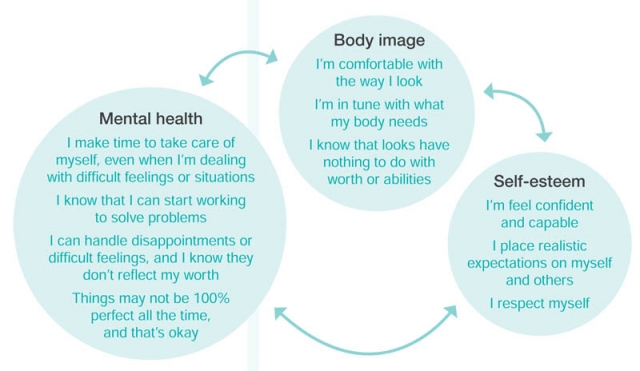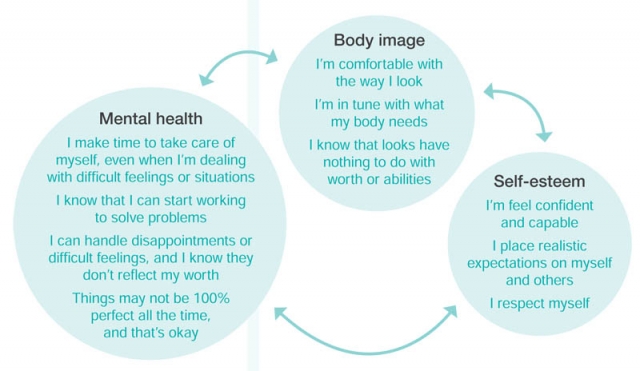Mental Health And Body Image: Building Self-Esteem
It might surprise many to learn that nearly 85% of people worldwide report feeling insecure about their body image at some point in their lives. This pervasive issue extends beyond superficial concerns, deeply affecting mental health and overall well-being. For professionals assessing this phenomenon, it's crucial to explore the intricate connection between body image perceptions and self-esteem.
Historically, societal standards of beauty have oscillated dramatically, often contributing to fluctuating self-esteem levels. The advent of social media has exacerbated this, with studies showing that heavy social media usage correlates with increased body dissatisfaction. As professionals, recognizing and integrating strategies like cognitive behavioral therapy and support groups can significantly mitigate these impacts, fostering healthier self-perceptions and improved mental health outcomes.

The Connection between Mental Health and Body Image
Impact of Negative Body Image
Negative body image can have severe effects on mental health. People with poor body image often face anxiety and depression. These feelings can lead to social withdrawal and isolation.
This discontent with one's appearance often starts at a young age. It is further compounded by constant exposure to idealized body types. These unrealistic standards can intensify feelings of inadequacy.
It's vital to recognize harmful self-perceptions early. Intervention can prevent long-term mental health issues. Supportive environments play a significant role in this process.
Societal and Media Influences
Societal norms greatly impact how individuals perceive their bodies. Media representations often show a narrow definition of beauty. This leaves many feeling they don't measure up.
Social media has amplified this issue. Filters and editing tools create impossible beauty standards. Constant comparison can erode self-esteem.
However, there are movements promoting body positivity. These initiatives encourage accepting diverse body types. Such efforts can positively influence mental health.
Psychological Factors
Mental health and body image are closely linked. Low self-esteem can result from negative body image. Feeling unworthy or unattractive affects daily life and relationships.
Cognitive Behavioral Therapy (CBT) is often used to address these issues. CBT helps change negative thought patterns. It supports building a healthier self-image.
Understanding psychological factors is crucial. Knowing the root causes aids in effective treatment. This holistic approach benefits both body and mind.
Building a Positive Body Image
Improving body image starts with self-awareness. Identifying negative thoughts is the first step. Replacing them with positive affirmations can boost self-esteem.
Supportive communities play a key role. Friends and family can provide encouragement. Professional help is also often beneficial.
Embracing diversity in body types should be a collective goal. Challenging societal norms is vital. This leads to healthier mental well-being for everyone.
Statistics on Body Image and Mental Health
The impact of body image on mental health is vast and well-documented. Research shows that 80% of women and 34% of men are dissatisfied with their bodies. These statistics highlight a growing concern globally.
Prevalence of Body Image Issues
Body image concerns are widespread among teenagers. Studies reveal that 53% of American girls feel unhappy with their bodies by age 13. This dissatisfaction often continues into adulthood.
Social pressures contribute significantly to these feelings. Media portrayals of ideal bodies affect self-perception. The constant comparison can lower self-esteem dramatically.
Efforts to combat these issues are ongoing. Campaigns promoting body positivity are gaining traction. They aim to shift societal norms towards more inclusive definitions of beauty.
Link Between Body Image and Mental Health Disorders
Body image issues often lead to mental health disorders. Nearly 70% of those with eating disorders report that body dissatisfaction was a major factor. This emphasizes the critical need for early intervention.
Common disorders include anxiety and depression. These conditions are frequently linked to poor self-perception. Addressing body image can help alleviate these mental health problems.
Therapies like Cognitive Behavioral Therapy are useful. They provide strategies to improve self-image. Professional guidance can significantly benefit those struggling.
Impact of Social Media on Body Image
Social media plays a dual role in body image perception. It can both positively and negatively influence teens and adults. Studies show a correlation between social media use and increased body dissatisfaction.
Platforms often showcase edited and filtered images. This can create unrealistic beauty standards. Constant exposure to such content affects mental well-being.
However, many influencers are promoting body positivity. These voices advocate for real, unedited images. Their work helps in making social media a more supportive space.
Impacts of Negative Body Image on Mental Health
Negative body image can have serious effects on mental health. People who constantly criticize their appearance may develop anxiety. This anxiety can lead to severe depression.
Many individuals with poor body image avoid social situations. They feel judged and prefer isolation. This can worsen their mental state.
Persistent negative thoughts about body image often lead to eating disorders. Conditions like anorexia and bulimia are common. These disorders pose significant health risks.
Another impact is on self-esteem. Low self-esteem can affect academic and professional performance. This creates a cycle where negative body image continuously harms mental health.
Body Dysmorphic Disorder: An In-depth Look
Body Dysmorphic Disorder (BDD) is a mental health condition. People with BDD obsess over perceived flaws in their appearance. These flaws are often invisible to others.
BDD can lead to severe emotional distress. Individuals may spend hours each day worrying about their looks. This disrupts daily life and routines.
Common symptoms include excessive grooming, mirror checking, and seeking reassurance. People might avoid social situations entirely. This isolation intensifies their mental health issues.
| Symptom | Description |
|---|---|
| Mirror Checking | Frequent inspection of perceived flaws |
| Excessive Grooming | Overly focused on fixing appearance |
| Reassurance Seeking | Constantly asking others about their looks |
| Social Avoidance | Staying away from social activities |
Often, BDD starts in adolescence. Teenagers are highly vulnerable to body image issues. Early intervention is crucial to prevent long-term impacts.
Treatment options include Cognitive Behavioral Therapy and medication. Therapy can help change negative thought patterns. Medications may reduce obsessive thoughts.
Support groups also play an essential role. Sharing experiences with others can be reassuring. It helps individuals feel less isolated in their struggles.
Improving Body Image: Strategies and Techniques
Improving body image begins with self-awareness. Recognize and challenge negative thoughts about your appearance. Replace them with positive affirmations.
Practicing self-care is another effective strategy. Activities like exercise, healthy eating, and adequate sleep can boost self-esteem. Taking time for yourself is important.
Media literacy is crucial in handling digital content. Understand that many images online are edited. Learn to appreciate natural bodies.
- Focus on what your body can do
- Wear clothes that make you feel comfortable
- Surround yourself with supportive people
Support groups offer a safe space to share experiences. Listening to others can be comforting and motivating. It helps to know you are not alone.
Sometimes, professional help is necessary. Therapists can provide valuable tools and techniques. Seeking help is a sign of strength.
Role of Social Media in Body Image Satisfaction
Social media plays a significant role in body image satisfaction. Edited photos often set unrealistic beauty standards. This can lead to dissatisfaction and low self-esteem.
Many users constantly compare themselves to these idealized images. This comparison can create a negative self-perception. Seeing perfect bodies daily can distort reality.
However, social media can also promote positive body image. Influencers advocating body positivity help shift perceptions. They often share unedited, real images.
- Follow accounts that promote body positivity
- Engage with content that makes you feel good
- Unfollow accounts that hurt your self-esteem
Parents and educators can help by teaching media literacy. Understanding that many images are altered is essential. Questioning digital content can reduce its negative impact.
Creating a balanced social media feed is also vital. Mix content about fitness, art, education, and body positivity. This variety promotes a healthier online experience.
Support Systems and Their Importance
Support systems are crucial for mental health. They provide emotional and psychological help. A good support system can act as a safety net during tough times.
Friends and family form the most immediate support network. Trusted relationships offer comfort and understanding. This helps in processing emotions better.
- Provides a sense of belonging
- Reduces feelings of isolation
- Offers practical help in times of need
Professional support is also essential. Therapists and counselors offer expert advice and coping strategies. Their specialized training makes a significant difference.
Peer support groups provide a platform to share experiences. Hearing others' stories can be comforting. This shared empathy strengthens individuals.
A mix of personal, professional, and peer support is ideal. Each type offers unique benefits. Combined, they create a robust safety net for mental wellness.
Building Self-Esteem for Improved Mental Health
Building self-esteem is crucial for mental health. A positive self-view can reduce anxiety and depression. Confidence boosts overall well-being.
Start by identifying strengths and talents. Focus on what you do well. Recognize and celebrate small achievements.
Practice self-compassion. Be kind to yourself, especially during setbacks. Negative self-talk can erode confidence.
Setting realistic goals is vital. Achieving these goals provides a sense of accomplishment. Success fosters a positive self-image.
- Surround yourself with supportive people
- Engage in activities you enjoy
- Avoid comparing yourself to others
Professional support can also help build self-esteem. Therapists can guide you through strategies to improve self-worth. Seeking help is a sign of strength.
Frequently Asked Questions
Understanding the relationship between mental health and body image can be key to building self-esteem. Here are some common questions answered simply.
1. How does social media impact body image?
Social media often showcases idealized body types, which can distort reality and set unrealistic beauty standards. People frequently compare themselves to these images, leading to dissatisfaction and low self-esteem.
However, many influencers now promote body positivity, sharing unedited photos that celebrate diverse body types. This encourages healthier perceptions and fosters a more supportive online environment.
2. What is Cognitive Behavioral Therapy (CBT) and how does it help with body image issues?
Cognitive Behavioral Therapy (CBT) focuses on changing negative thought patterns into positive ones. It is particularly effective in addressing issues related to low self-esteem and negative self-perception.
A therapist guides individuals through exercises designed to reshape their thinking about their bodies. Over time, this leads to a more balanced and positive view of oneself.
3. Can family support help improve body image?
Family support plays a crucial role in building healthy self-esteem and positive body image. Encouragement from loved ones can boost confidence significantly.
Candid conversations about insecurities can provide emotional comfort and practical advice. It creates a nurturing environment where one feels valued and accepted.
4. Why is media literacy important for improving body image?
Media literacy helps individuals recognize that many images in the media are manipulated or edited. Understanding this reduces the impact these images have on one's self-esteem.
This awareness encourages critical thinking about the content consumed daily, helping viewers appreciate natural beauty over unrealistic ideals presented by the media.
5. What activities can boost one's body image positively?
Physical activities such as exercise can improve one's perception of their own body by enhancing physical health and releasing endorphins that boost mood. Creative hobbies like painting or music provide an alternative focus away from appearance concerns.
Meditation and mindfulness practices also contribute positively by reducing stress levels associated with negative thoughts regarding one's appearance, thereby fostering greater inner peace.
Conclusion
Addressing the intertwined issues of mental health and body image is imperative for fostering self-esteem. Professionals have a crucial role to play in guiding individuals through effective strategies and providing the necessary support. Early intervention can prevent long-term psychological effects, making timely action essential.
Utilizing tools like Cognitive Behavioral Therapy, promoting media literacy, and cultivating supportive environments are key strategies. Emphasizing self-awareness and positive affirmations helps build a resilient self-image. With concerted efforts, it is possible to shift societal norms toward more inclusive and realistic standards of beauty.
